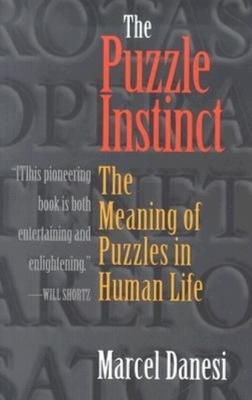
The Puzzle Instinct
Indiana University Press (Verlag)
978-0-253-21708-0 (ISBN)
One of the most famous anagrams of all time was constructed in the Middle Ages. The unknown author contrived it as a Latin dialogue between Pilate and Jesus. Jesus’ answer to Pilate’s question "What is truth" is phrased as an ingenious anagram of the letters of that very question: Pilate: Quid est veritas? ("What is truth?") Jesus: Est virqui adest. ("It is the man before you.")
The origin of anagrams is shrouded in mystery. One thing is clear, however—in the ancient world, they were thought to contain hidden messages from the gods. Legend has it that even Alexander the Great (356–323 b.c.) believed in their prophetic power.
—from Chapter Two
The most obvious explanation for the popularity of puzzles is that they provide a form of constructive entertainment. But in The Puzzle Instinct Marcel Danesi contends that the fascination with puzzles throughout the ages suggests something much more profound. Puzzles serve a deeply embedded need in people to make sense of things. Emerging at the same time in human history as myth, magic, and the occult arts, the puzzle instinct, he claims, led to discoveries in mathematics and science, as well as revolutions in philosophical thought.
Puzzles fill an existential void by providing "small-scale experiences of the large-scale questions that Life poses. The puzzle instinct is, arguably, as intrinsic to human nature as is humor, language, art, music, and all the other creative faculties that distinguish humanity from all other species."
Marcel Danesi is Professor of Semiotics and Anthropology at the University of Toronto and Director of the Program in Semiotics and Communication Theory. His books include Increase Your Puzzle IQ and Of Cigarettes, High Heels, and Other Interesting Things: An Introduction to Semiotics. He lives in Toronto.
Preface 1. Why Puzzles? 2. Puzzling Language: Riddles, Anagrams, and Other Verbal Perplexities 3. Puzzling Pictures: Optical Illusions, Mazes, and Other Visual Mind-Bogglers 4. Puzzling Logic: Deductions, Paradoxes, and Other Forms of Mind Play 5. Puzzling Numbers: Magic Squares, Cryptarithms, and Other Mathematical Recreations 6. Puzzling Games: Chess, Checkers, and Other Games 7. The Puzzle of Life Solutions Bibliography and General Reading List Index
| Verlagsort | Bloomington, IN |
|---|---|
| Sprache | englisch |
| Maße | 155 x 235 mm |
| Gewicht | 367 g |
| Themenwelt | Geisteswissenschaften ► Philosophie ► Sprachphilosophie |
| Geisteswissenschaften ► Psychologie ► Allgemeine Psychologie | |
| Geisteswissenschaften ► Psychologie ► Verhaltenstherapie | |
| Mathematik / Informatik ► Mathematik | |
| ISBN-10 | 0-253-21708-3 / 0253217083 |
| ISBN-13 | 978-0-253-21708-0 / 9780253217080 |
| Zustand | Neuware |
| Haben Sie eine Frage zum Produkt? |
aus dem Bereich


